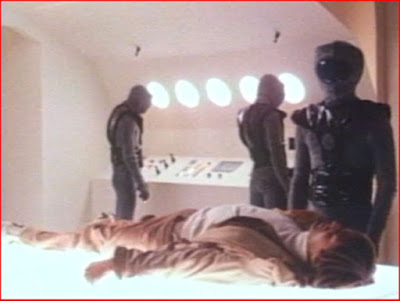 Roy Garrett, the credited writer and director of Eyes Behind the Stars, was a member of the National Investigation Committee on Aerial Phenomena and a field investigator for the Aerial Phenomena Research Organization. All of that seems to be true except for the man's name. "Garrett" was the sometime screen name of Mario Gariozzi, who is cited as an investigative researcher in some UFO literature online. In his hands, Occhi dalle stelle becomes a cross between Sunn Classic Pictures's Hangar 18 and Michelangelo Antonioni's Blow-Up. The Antonioni part is the film's MacGuffin. A fashion photographer inadvertently catches evidence of a UFO landing during a lengthy photoshoot in the woods. The aliens take no chances with him, kidnapping and probing him in ways best left to the imagination. Just laying on a slab is enough to fill the picture snapper with bug-eyed terror. The aliens themselves are not left to the imagination -- unless you want to see them out of uniform.
Roy Garrett, the credited writer and director of Eyes Behind the Stars, was a member of the National Investigation Committee on Aerial Phenomena and a field investigator for the Aerial Phenomena Research Organization. All of that seems to be true except for the man's name. "Garrett" was the sometime screen name of Mario Gariozzi, who is cited as an investigative researcher in some UFO literature online. In his hands, Occhi dalle stelle becomes a cross between Sunn Classic Pictures's Hangar 18 and Michelangelo Antonioni's Blow-Up. The Antonioni part is the film's MacGuffin. A fashion photographer inadvertently catches evidence of a UFO landing during a lengthy photoshoot in the woods. The aliens take no chances with him, kidnapping and probing him in ways best left to the imagination. Just laying on a slab is enough to fill the picture snapper with bug-eyed terror. The aliens themselves are not left to the imagination -- unless you want to see them out of uniform.
Maybe the aliens are meant to look menacing, but I just want to pet them.
Our hero (above center) has his troubles fighting men, but takes no chances with women.
Despite the superficial sci-fi trappings, Occhi dalle stelle is more conspiracy thriller, at least in intention, than futuristic fantasy. There are fewer scenes of saucers in flight, or even of fuzzy-costumed aliens probing victims, than there are of Robert Hoffman fighting conspirators and their goons with fists and guns. Some of the stagings and set design suggest a Vittorio Storaro influence on cinematographer Erico Menczer, but the usual limitations of a Mill Creek disc make a fair appraisal impossible. Most of the alien activity consists of POV camera crawls, flashing lights and vanishing objects. It's a grim affair in more ways than one, capped with a typical Seventies finish that here, given the auteur's own interest in the subject, sounds almost like a cri de coeur against the cover-up that simply must exist. By Mill Creek standards, Eyes Behind the Stars has some camp value thanks to the goofy photo-shoot scene, the funky looking aliens, and the random telepath, but there's also a mean-spiritedness to it, possibly reflecting the director's frustrations as a UFO researcher, that has its darkest expression when the hero takes out his frustrations on a female character. That puts a little edge on the goofiness that viewers might find gratifying, but for its current target audience of Mill Creek fans the film probably could have used more goofiness.





2 comments:
Aliens or deep-sea explorers... it's always tough to tell the difference.
Kev, all I can say is that I wouldn't want to go diving in that get-up. It'd probably take forever to dry and would probably shrink.
Post a Comment